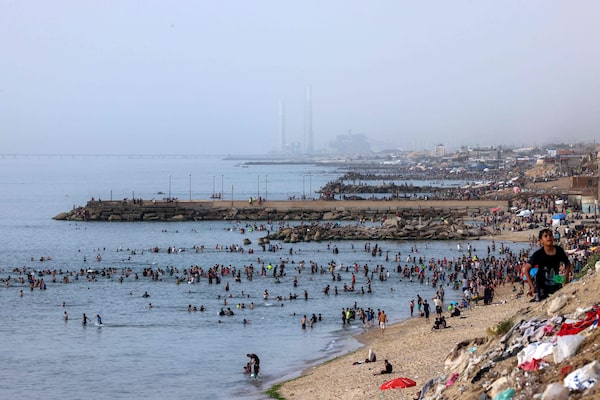If you’re reading this on the web or someone forwarded this e-mail newsletter to you, you can sign up for Globe Climate and all Globe newsletters here.
Good afternoon, and welcome to Globe Climate, a newsletter about climate change, environment and resources in Canada.
If you’ve been extra sneezy this season, you’re not alone. Across North America, seasonal allergies are getting worse, in large part due to changes in pollen driven by climate change.
On a recent episode of The Globe’s daily news podcast, The Decibel, Dr. Anne Ellis explained how changes in our weather patterns are affecting pollen seasons, leading to a record pollen count in the last two years. Dr. Ellis, a professor in the department of medicine at Queen’s University, says that higher concentrations of CO2 in the air have also been shown to increase the allergenicity of plants.
Experts say we can alleviate a worsening allergy season by mitigating climate change, targeting problematic plant life and providing better pharmacare.
Now, let’s catch you up on other news.
Noteworthy reporting this week:
- Wildfires: Number of wildfires in Nova Scotia, Alberta and Quebec straining resources
- Wildfires: Questions of how to protect communities from wildfire risk loom large as thousands flee homes nationwide
- Fisheries: The federal Fisheries Minister is delaying a decision on closing the remaining ocean-based salmon farms in British Columbia, after pressure from First Nations and the fish-farm industry.
- Heat waves: Record-breaking heat hits China as country grapples with climate goals and coal dependence
- Biodiversity: Studies probe toxic burden on fish from algal blooms in Lake Erie and Lake St. Clair
- Politics: Ottawa hopes for collaboration as Danielle Smith vows to stop federal energy and climate policies
- Conservation: Tool that tracks birds’ migration patterns could aid in conservation efforts, biologists say
- Transportation: Trucking industry says technology doesn’t exist for it to meet B.C.’s zero-emissions goal
- From The Narwhal: These are 11 of B.C.’s most ‘polluting and risky’ mines
A deeper dive
Canada has a data gap in tracking wildfire risk for vulnerable communities
Ryan MacDonald is a senior editor at The Globe heading the climate, energy and environment team
Wildfires illustrate the implications of climate change with dramatic visual impact. This wildfire season, perhaps more than in recent memory, is showcasing something else: Just how close to the woods we’ve built our communities.
It’s all about the Wooee.
The wildland-urban interface (WUI, pronounced “woo-ee”) encompasses areas where homes and other structures meet, or are interspersed with, forests and grasslands. It’s estimated that more than 12 per cent of Canadians live within it, as well as nearly one-third of First Nations living on reserves. While the majority of today’s wildfires don’t burn buildings, they are expected to become more frequent and intense in a warming climate.
And Canada has a problem. We don’t have a clear picture of where Canada’s WUI is expanding.
As The Globe’s Wendy Stueck and Matthew McClearn revealed in this story, efforts to map and analyze WUI territory are not moving quickly enough.
Matt, a data journalist at the Globe who has looked extensively at flood mapping in Canada, goes further: “We even lack crucial data inputs, such as high-resolution maps of vegetation and other fire fuels, or detailed records about fires over a sufficiently long time period to capture the variability of fire regimes.”
These data gaps impede our ability to reduce risk for communities by making crucial planning decisions. If WUI growth continues unchecked, wildfire problems will likely get worse. But the question of how to limit expansion into WUI areas is a prickly one, with growing populations and people’s desire to live close to wooded areas bumping up against wildfire threats.
As the planet warms, wildfire experts, climatologists and doctors warn Canada is headed into longer and increasingly intense wildfire seasons, and prolonged periods of smoke exposure. We need more data and a national strategy to protect our vulnerable communities.
- Ryan
What else you missed
- Drought fuels water conflict between farmers and environmental activists in France and Spain, raising questions about how water management needs to change as climate change takes hold.
- The Biden administration ordered a 20-year ban on oil and gas drilling to protect tribal sites outside New Mexico’s Chaco Culture National Historical Park.
- British Columbia is adding $17.25-million for ongoing efforts to save declining populations of wild Pacific salmon.
- Wildfires, other extreme weather driving insurance costs up over time, experts say.
Opinion and analysis
Holly Hogan: I spend my days staring at the ocean. Trust me, plastic in our waters is a global crisis
David T. Price and Robin Collins: A counterintuitive climate defence: Harvesting forests to combat emissions
Tony Keller: Danielle Smith wants a fight with Justin Trudeau. But what if there’s not much to fight about?
Barry Rueger: Nova Scotia’s forest fires make me wonder if our dreams of a green, rural life were misguided
Ken McMullen and Tina Saryeddine: Canada’s overburdened firefighters aren’t getting enough support
Green Investing
One of Greece’s top industrial and power companies is launching a $1.7-billion solar-energy project in Alberta that it says will be the largest of its kind in Canada. Mytilineos SA says all five projects should be fully operational by 2026 or 2027. Once finished, the entire project will have 1.4 gigawatts of capacity, enough to power 200,000 homes.
- Global additions to renewable energy capacity are on track to surge this year as growing energy-security worries and improving costs drive investments
- Enbridge keen to revive natural-gas pipeline plans in northern B.C. as climate activists say the focus should be on renewable energy
- Stellantis, Vulcan Energy sign deal for geothermal projects in France
Making waves
Each week The Globe will profile a Canadian making a difference. This week we’re highlighting the work of Dr. Melissa Lem prescribing nature to patients.

Dr. Melissa LemHandout
I’m Dr. Melissa Lem, a Vancouver family doctor, director of PaRx, Canada’s national nature prescription program, and president of the Canadian Association of Physicians for the Environment.
Finding nature growing up, whether it was in my suburban Toronto backyard or camping in national parks, is where my inspiration to connect people to and protect nature first bloomed. Today more than 10,000 health professionals are registered in PaRx, including more than 5 per cent of all physicians in the country. In December, we made history at the UN Biodiversity Conference (COP15) when the Canadian Medical Association became the first national physicians’ association in the world to formally endorse a nature prescription program: our very own PaRx. This January, PaRx was proud to be nominated by McGill University for a prestigious Earthshot Prize, launched in 2020 by Prince William and David Attenborough.
Whether it’s via climate panel appearances on CBC Radio or more than a decade’s worth of television segments as a medical expert, I know how important it is to take lessons we’ve learned through our lives and convey them to the public simply. And people who are more nature-connected engage in more pro-environmental behaviours – making nature prescriptions not only good for human health, but planetary health too.
- Melissa
Do you know an engaged individual? Someone who represents the real engines pursuing change in the country? Email us at GlobeClimate@globeandmail.com to tell us about them.
Photo of the week

Palestinians gather on a beach in Gaza City on June 2, 2023, during a heat wave.MOHAMMED ABED/AFP/Getty Images
Guides and Explainers
- Want to learn to invest sustainably? We have a class for that: Green Investing 101 newsletter course for the climate-conscious investor. Not sure you need help? Take our quiz to challenge your knowledge.
- We’ve rounded up our reporters’ content to help you learn about what a carbon tax is and just generally how Canada will change because of climate change.
- We have ways to make your travelling more sustainable and if you like to read, here are books to help the environmentalist in you grow, as well as a downloadable e-book of Micro Skills - Little Steps to Big Change.
Catch up on Globe Climate
- The Indigenous community fighting fire with fire
- How climate change is fuelling a new kind of ‘fire weather’
- Wildfires are another climate change wake-up call
- The Inuit greenhouse powered by renewable energy
We want to hear from you. Email us: GlobeClimate@globeandmail.com. Do you know someone who needs this newsletter? Send them to our Newsletters page.
 Samantha Edwards
Samantha Edwards